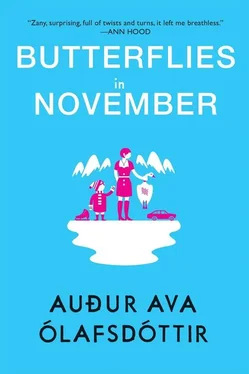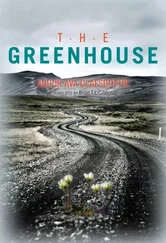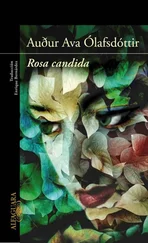Some of the countries further south are now experiencing temperatures of minus thirty degrees, the anchor continues, while just 200 kilometres from the Arctic Circle thermometers are hitting plus eleven degrees. Such is the unpredictability of nature, which will always take man by surprise.
Since I’m travelling under my own steam and, what’s more, with an unrelated child, I don’t have the courage to tackle the dark brown mass of water on the other side of the sand in my car and therefore have to find somewhere for us to spend the night in the black desert in the middle of this dark winter day.
I scan the map that lies open on the passenger seat beside me, first to see how long this sandy desert extends for and roughly count the number of blue lines, and then to look for the red points that represent made beds and breakfast buffets with orange wedges, muesli and teabags. It’s mainly on the narrow green strip along the coast that we have some hope of finding accommodation.
Ten minutes before reaching it, we can already start to hear the mounting rumble of the glacial torrent — dark grey, full of sand, stones and debris. We stop the car by the bridge to look into the water.
Tumi walks beside me, waving his arms about like a fearless man. Impossible to look at anything but the fury of the grey maelstrom, no firm point on which to fix our gaze. Drenched, we freeze a moment on the edge of the bridge, watching the enormous mass of muddy brown water run by.
By the time we get back to the car, it’s as if an entire hour’s worth of river had passed. I turn on the heater full blast and the boy writes two words on the foggy windows. Like an ancient Greek metaphysician: Water runs.
I take the warning sign, which the water-measuring experts have put up in the sand, seriously and don’t venture out on any unnecessarily risky explorations. The question, though, is whether we should cross the next bridge and then be trapped on that side or carry on along this side of the river and then be forced to turn around. The first option seems slightly better; at some point one has to stop brooding over the past. Besides, we need to stop for the night soon. A luxury hotel has recently been opened nearby, complete with solarium, jacuzzi and bar. The area that seemed utterly deserted earlier is now suddenly busy with traffic. “Allow yourself to be yourself,” the hotel’s slogan reads.
As I’m about to cross the last river in the sand desert, I suddenly come up against a white car in the middle of a single-lane bridge and slam on the brakes, as does the man in the car opposite me. We both step out.
“I thought you were going to stop,” he says. “I didn’t realize you were driving over until it was too late.”
“I somehow thought you were stopping as well,” I say, still blinded by his headlights. The engines of both cars are running.
“I’ll reverse then,” he says, “I was actually thinking of turning back to spend the night in the hotel anyway.”
“I can reverse too.”
“Are you driving east?”
“Yeah, I’m having a summer bungalow moved there.”
“Over Christmas?”
“Yes, over Christmas, are you going west then?”
“Yes, but I’ll be back soon, maybe we’ll meet again then.”
His glasses are all misty, which makes it difficult for me to make out the eyes concealed behind them. I rub the sleeve of his jacket, which is an odd response to a complete stranger. He’s dark and has such short hair that all his childhood scars are visible, both on his scalp and designer stubble.
“Are you a hunter?” I hear myself asking him.
“No, I’m no hunter. I came across some ptarmigan chicks on the road this summer and my car capsized when I slammed on the brakes. I’ve got a sick falcon in the car that I need to take to town. He needs some expert care, in the worst-case scenario he’ll end up being stuffed. You’ve got to keep quiet about rare birds that stop off here for just a few hours before heading on to America, or someone will try to stuff them. They want to have everything stuffed in the south, causes them the least hassle.”
When I’m back in the car, I realize I haven’t given the child anything to eat for much of our drive across the sand desert, so I stick a straw into a carton of milk and hand it to him. He stares at the floor as he clutches the carton with both hands, sucking its contents dry. I bite the peel of a banana, feeling its bitter taste in my mouth, and hand it to him, without taking my eyes off the road, without slowing down, without breaking our continuity.
Hotel Sand stands in the middle of the desert, a brand-new blockhouse building with minibars, a satellite dish and loosely woven brown curtains in the rooms that don’t fully cover the windows. We’re surrounded by water, although the road men have started fixing the bridges on the eastern side of the desert.
“It’s wonderful to pass through here,” a foreigner confides to me in the lobby, “but I wouldn’t like to be stuck here. It’s different for you people who are used to sand deserts and darkness,” he adds, “because you were born and brought up in this. Of course, it would be different if the sand weren’t black but golden, and the temperature was about ten degrees higher, to be able to adapt I mean.”
We book ourselves into the hotel, having been preceded by the Estonian male choir, which we seem to bump into everywhere it goes on its tour around the country. They’ve already stayed here one night and have another two to go. This evening they will be giving a concert, followed by a surprise number, which is already attracting guests from the dam construction site. The hotel was built in record time, I’m told, in true Wild West style, and apparently is an exact replica of a hotel in west Texas, the only difference being that the original model is 300 rooms bigger.
“We expect to be enlarging the hotel over the coming years,” says the hotel manager in the lobby, “the growth potential is limitless.”
The restaurant on the ground floor has small carved wooden doors that swing in both directions, just like in old Westerns or those changing cubicles in fashion boutiques. At the top of the dining hall there is a varnished wooden stage, equipped with microphones, and a dance floor in front of it with mirrors.
We throw ourselves on the bed with the kitten between us and watch the evening TV news. Maps appear with circles around the areas where rivers have overflowed and reservoirs seem to be on the brink of bursting. The presenter briefly mentions the Estonian male choir and its accompanying troupe of young “artistic dancers” with a slightly smug air, before passing the ball to the sports reporters.
We zap through the foreign channels. Tumi is holding the remote and is therefore the master.
A naked snow-white woman crouches down on a golden beach to lean her head against a giant bottle of perfume, gently caressing its neck with the tip of her fingers and then rising towards the lid, stroking that as well, without, however, unscrewing it, before finally dropping her head and closing her eyes. The bottle is the size of a man, but the woman is small, fine and fragile. This bottle seems to be the only thing she has in the world to lean on.
We sit, stroking the cat and watching the woman in the commercial, mesmerized. It’s on a French channel. A woman is an island , a velvety male voice says in the distance. This is followed by a moment’s silence.
“Beautiful lady,” says the boy, clearly and distinctly.
“Yes, beautiful lady,” I say, laughing.
“Beautiful lady,” he repeats before placing the palm of his hand on my belly.
“We’re only allowed to serve alcohol with the food, if you buy more than chips,” says a teenage waitress in the dining room.
Читать дальше












